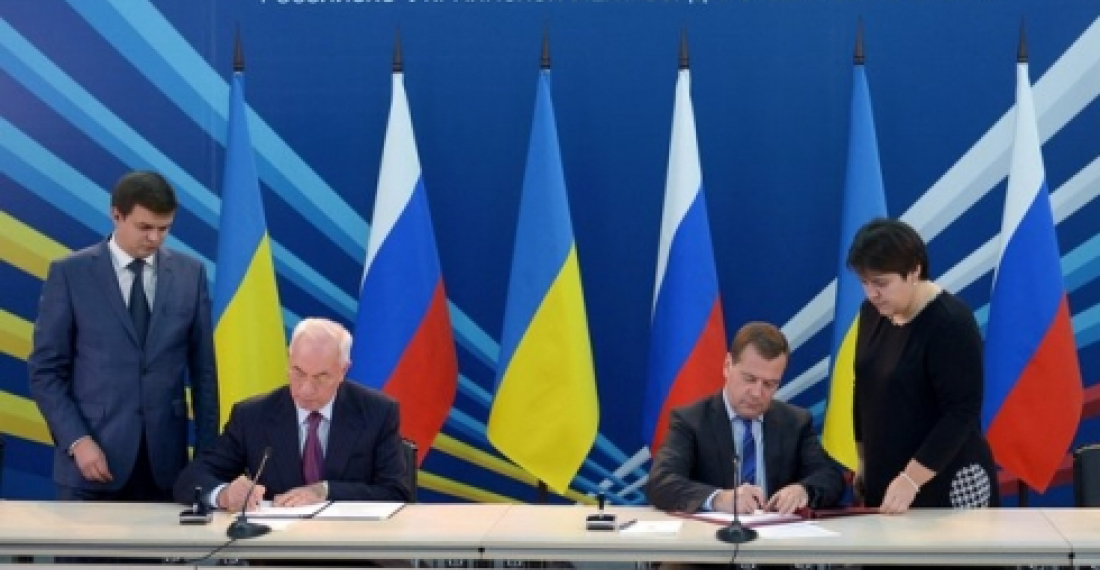Russian Prime Minister Dimitri Medvedev has again questioned Ukraine's wish to enter into an Association Agreement with the European Union. Speaking at a press Conference with his Ukrainian counterpart Mykola Azarov, after a meeting of the Russia-Ukraine Intergovernmental Commission, Medvedev said that he did not know why Ukraine wanted to sign an association agreement with the European Union and that he could not see any particular benefits for Ukraine in doing so.
"One thing is clear: Of course, after an association agreement is signed - and this is our open, simple and sincere position - it will be very difficult for Ukraine to join the Customs Union if it wants to," he said. "I believe [its] chances for full-fledged membership will be practically zero," the Russian Prime Minister said, according to RIA Novosti. Medvedev reiterated that Moscow wanted to build an "economic union, not some amorphous association," so the "Russia-Kazakhstan-Belarus plus Ukraine" formula was unacceptable.
Russian officials have been very active in recent weeks in an effort to derail plans of the European Union to sign Association Agreements with those Eastern neighbours who wanted to do so and who satisified the EU stringent criteria. Most of the Russian arms twisting has been taking place behind the scenes, but one senior Russian official has apparently been given the role of wielding the knife in the open. President Putin's Adviser Sergey Glazyev has given several interviews aimed at adding pressure on the leadership of those countries that continue to reject the Russian "customs union" option.
Speaking on the popular Radio Station "Echo of Moscow" on 10 October Glazyev said that European officials impose their standard text worked out over dozens of years upon their Eastern partners. Glazyev said that Armenia was almost dragged into a conveyor but "with the support of our experts, we helped our Armenian counterparts analyse the text of the agreement with the EU".
"One can't get associated with the EU and sign the Agreement on Common Economic Space with Russia simultaneously. Obviously, it's not possible from a legal point of view. The Armenian government got confused in its choices. They thought they could simultaneously sign the Agreement with the EU and remain part of the CSTO, for instance. And there is a political component there as well which reads that the side concluding an Association Agreement with the EU is committed to following the lead of European policy and take part in the settlement of the regional conflicts under the EU guidance. And then the President as a person responsible for the country's security was asked the question: "How is it possible to be involved in the settlement of NK conflict with Azerbaijan under the EU leadership?" That's an interesting question. When such simple questions are asked it's obvious that the draft Association Agreement deprives the country of sovereignty, independence and makes it EU's colony", said Sergey Glazyev.
According to him, expert consultations are currently being held and "by 2015, both Kyrgyzstan and Armenia will join simultaneously the Customs Union, Common Economic Space and Eurasian Union".
The Russian President's Advisor said that as a part of a single customs territory, Armenia will technically have the same customs regime as Kaliningrad region of Russian Federation.
Answering a question about Ukraine, Sergey Glazyev said: "I am sure common sense will prevail".
You can listen to the interview of Sergei Glazyev (in Russian) on "Echo of Moscow", in full here.
source: Commonspace.eu with Echo of Moscow, Ria Novosti and Mediamax.
photo: Russian Prime Minister Medvedev with Ukrainian Prime Minister at the meeting of the Russia-Ukraine Inter-Governmental Commission (picture courtesy of the Press Service of the Prime Minister of Russia)







